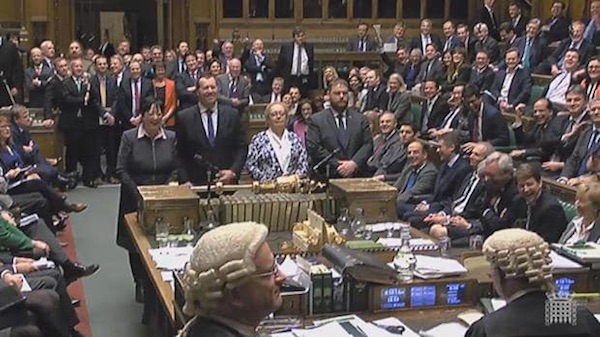
In a potentially historic development, the London parliament has voted to allow the British government renege on the 1998 Good Friday peace agreement as part of its negotiations to leave the European Union.
The Social Democratic and Labour Party (SDLP) proposed the amendment to the Brexit bill which paves the way for Britain to withdraw from the EU following last year’s referendum. That referendum was rejected in the North of Ireland and Scotland, but passed due to high levels of support in England and Wales.
The SDLP amendment was defeated by 327 votes to 288 as the bill to trigger Brexit was overwhelmingly passed by Westminster this week. The outcome legally relegates the Good Friday Agreement and rewrites that section under which the consent of a majority in the Six Counties is required for a change in its constitutional position.
Commenting on the vote, Sinn Fein President Gerry Adams said: “This decision confirms my worst fears. The British government doesn’t care one iota for the people of the north.”
The 26 County Taoiseach Enda Kenny even warned of a possible return to armed conflict. He said “new ways” will have to be thought out for the peace process or the consequences could be serious for Ireland.
“Any semblance to a return to what they call a hard border, or borders of the past, brings with it serious challenges for this country,” he said. “I don’t mean just in terms of trade or economy, but what we had before - criminality and even armed conflict. I wouldn’t want to be alarmist about it, but this is a political challenge here.”
Sinn Fein said it is embarking on a Europe-wide “diplomatic offensive” to convince political leaders of the case for the Six Counties of the north of Ireland retaining special EU status post Brexit.
Unveiling her party’s candidate line-up for March’s Assembly election, Michelle O’Neill, the party’s northern leader, said she had written to the 27 other EU states to lobby for their support.
She was heavily critical of British Direct Ruler James Brokenshire’s comments last week, when he appeared to rule out the possibility that the region could retain a form of special EU designation.
“I have got news for you James, it won’t be your decision,” she said.
“It will be the other member states who decide the terms of Brexit. That is why Sinn Fein is on a diplomatic offensive across the length and breadth of Europe, where there is a hell of a lot more sympathy for our case than for the right wing, anti-immigrant agenda which has fuelled the Brexit fiasco in the first place.”
Meanwhile, Sinn Fein’s Pat Doherty told a parliamentary committee in Dublin that Ireland should not be “naive” and needed to realise Britain had only permanent interests, not permanent friends.
“There is no such thing as a soft border... just soft words,” he told the Oireachtas Joint Committee on the Implementation of the Good Friday Agreement.
“The road the British government is travelling on is going to lead to a hard border on the island of Ireland. We are in for a very, very difficult time.”
The West Tyrone MP said it did not matter that every political party, north and south, was opposed to a 310 mile hard border being reimposed between both parts of the island.
“We should not be naive about the intention of the British government,” he said. They are going to have a hard border and they do not care in any meaningful way about its impact on Ireland.”
Mr Doherty was hopeful that Europe could yet devise “special circumstances” for the north of Ireland given that every Irish citizen, including those born north of the border, is entitled to be an EU citizen, and are recognised as such under the Good Friday Agreement.
However, he warned: “The road the British government is travelling on is going to lead to a hard border on the island of Ireland. We are in for a very, very difficult time.”
![[Irish Republican News]](https://republican-news.org/graphics/title_gifs/rn.gif)
![[Irish Republican News]](https://republican-news.org/graphics/title_gifs/harp.gif)

